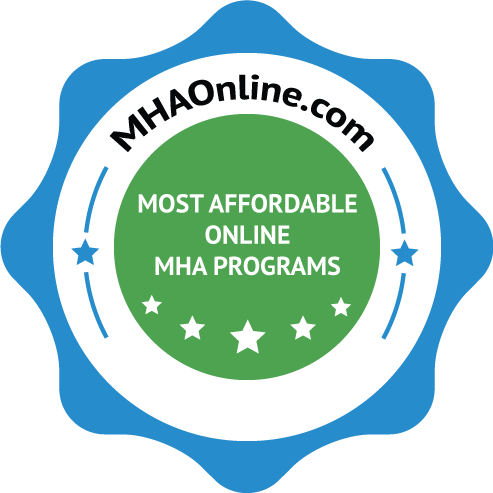Online MHA Programs Ranked by Affordability (2026)

MHA Search
For the latest academic year, we have 170 schools in our MHAOnline.com database and those that advertise with us are labeled “sponsor”. When you click on a sponsoring school or program, or fill out a form to request information from a sponsoring school, we may earn a commission. View our advertising disclosure for more details.
Student loan debt in the United States continues to reach high levels, with recent reports showing a total balance of $1.81 trillion (EducationData 2025). Around 92 percent of this debt is attributed to federal student loans, affecting over 42 million students. The average federal student loan debt balance is over $39,000. This huge amount of debt is a big concern for students, families, and experts, ultimately creating a need for more affordable master’s degrees.
In addition, professionals will want to seek out degrees where growth opportunities exist, the job market is expanding, and salaries are attractive. Enter online master of healthcare administration (MHA) programs. According to the Bureau of Labor and Statistics (BLS 2025) data, medical and health services managers earn a median annual salary of $117,960 per year ($56.71 per hour). Median annual wages were highest in pharmaceutical and medicine manufacturing ($222,350) and chemical manufacturing ($221,260).
Jobs for the medical and health managers market are exploding and are expected to increase 23 percent nationally between 2024 and 2034, with the addition of 142,900 positions (BLS 2025). Healthcare administrators typically have at least a bachelor’s degree, but master’s degrees are becoming increasingly common for these positions. As such, in this article, we cover online MHA programs ranked by affordability for the 2025-2026 academic year.
These rankings are based on tuition data MHAOnline.com collected in mid-2025 from over 700 online MHA programs and related graduate degrees. Tuition information is as current as possible, taken from the 2025-2026 school year numbers, as published by each school. The tuition number listed for each school represents the total estimated tuition for its entire program, and not the cost per semester or year.
| Featured Affordable Online MHA Programs | ||
|---|---|---|
| Auburn University of Montgomery | Master of Healthcare Administration (MHA) | Visit Program Website |
| Purdue Global | Online Master's - Health Care Administration | Visit Program Website |
| Southern New Hampshire University | Online MS in Healthcare Administration | Visit Program Website |
| Rasmussen University | MHA - Master of Healthcare Administration | Visit Program Website |
| Ohio University | Online Master of Health Administration (MHA) | Visit Program Website |
| Sacred Heart University | Online Master of Health Administration (MHA) | Visit Program Website |
sponsored
×
For the latest academic year, we have 170 schools in our MHAOnline.com database and those that advertise with us are labeled “sponsor”. When you click on a sponsoring school or program, or fill out a form to request information from a sponsoring school, we may earn a commission. View our advertising disclosure for more details. |
||
Most Affordable Online MHA Programs (2026)
Check out the 50 most affordable online MHA programs by total program tuition, based on tuition rates for the 2025-2026 academic year.
Find an Affordable Online MHA Program
With the rising education costs, graduate programs may seem too expensive of a proposition. These MHA programs ranked by affordability can open up some options you might have yet to consider.
These online programs in healthcare administration can be convenient, affordable, and completed in just one to two years. With the growing need for healthcare professionals with master ’s-level education, these programs can provide a career pathway without the heavy burden of more expensive tuition costs.

